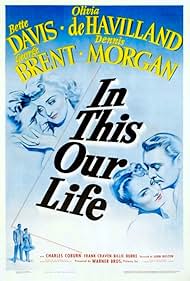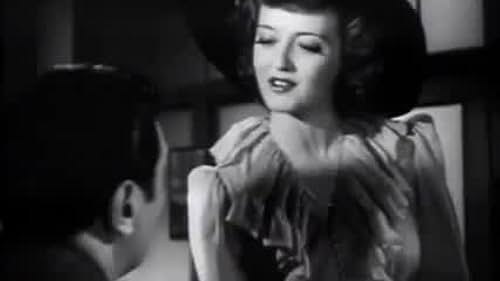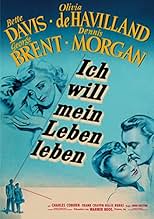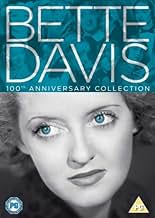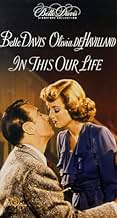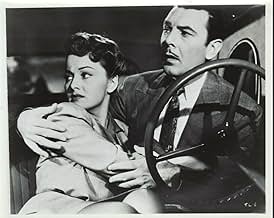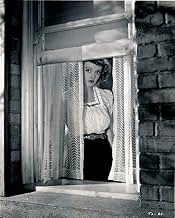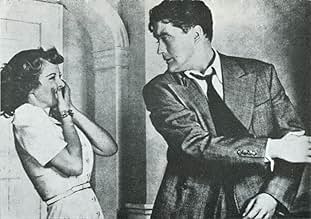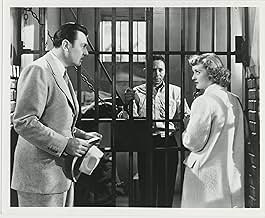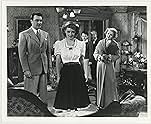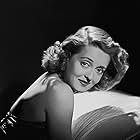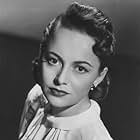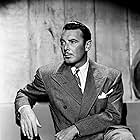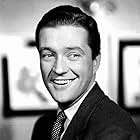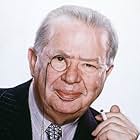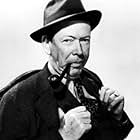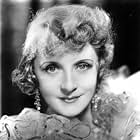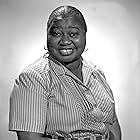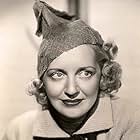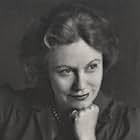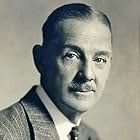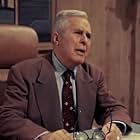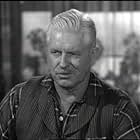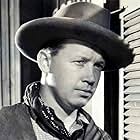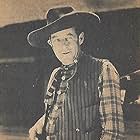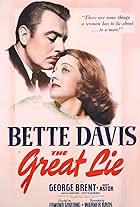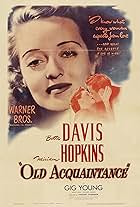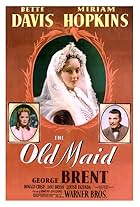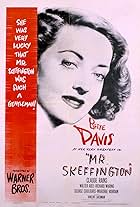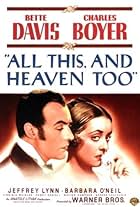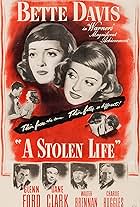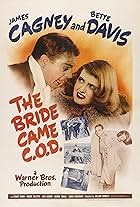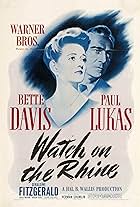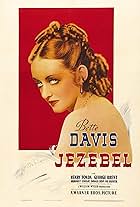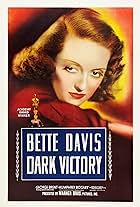Ajouter une intrigue dans votre langueThe day before her wedding, a pampered young woman absconds with her sister's husband. Her sister begins seeing the woman's former fiancé.The day before her wedding, a pampered young woman absconds with her sister's husband. Her sister begins seeing the woman's former fiancé.The day before her wedding, a pampered young woman absconds with her sister's husband. Her sister begins seeing the woman's former fiancé.
- Prix
- 3 victoires au total
- Worker
- (uncredited)
- Worker
- (uncredited)
Histoire
Le saviez-vous
- AnecdotesDirector John Huston carried on a torrid affair with Olivia de Havilland during the shoot. Warners studio head Jack L. Warner said, "Anyone could see that . . . it was Valentine's Day on the set . . . When I saw the rushes I said to myself, 'Oh-oh, Bette has the lines, but Livvy is getting the best camera shots'."
- GaffesWhen Stanley arrives home and Uncle Williams asks her for a kiss without turning the cheek; nevertheless Stanley still turns the cheek and he misses her lips. But on the next cut Uncle Williams has lipstick on his mouth and she gives him a handkerchief to wipe it off.
- Citations
Roy Timberlake: What made you decide to become a lawyer?
Parry Clay: Well, you see, it's like this, Miss Roy: a white boy, he can take most any kind of job and improve himself. Well, like in this store! Maybe he can get to be a clerk or a manager. But a colored boy, he can't do that. He can keep a job or he can lose a job. But he can't get any higher up. So he's got to figure out something he can do that no one can take away. And that's why I want to be a lawyer.
Roy Timberlake: Why, Perry, that's wonderful. I had no idea. Minerva never told me.
Parry Clay: Ma's afraid for a colored boy to have too much ambition.
- Autres versionsAlso available in a computer colorized version.
- ConnexionsFeatured in AFI Life Achievement Award: A Tribute to Bette Davis (1977)
- Bandes originalesSouth American Way
(1939) (uncredited)
Music by Jimmy McHugh
Played on the phonograph
Reprised on a juke box at the Southside Tavern
This is the second film directed by John Huston, following his impressive debut with 'The Maltese Falcon'. Considering how far removed the subject matter is from Huston's usual territory, he does an impressive job here. More about Huston a bit later.
Here we have Bette Davis and Olivia de Havilland as sisters, and there are no prizes for guessing which is the bad sister and which is the good 'un. The sisters are named Stanley and Roy, but there's no sexual subtext for those male names. The bad sister, having dumped her boring fiancé (George Brent), sets her cap for the good sister's handsome husband (Dennis Morgan).
In her later years, Bette Davis occasionally gave informal talks at colleges in California. My future sister-in-law was present at one of these. During the Q&A, an eager fan breathlessly pointed out that Bette Davis had co-starred with Bogart, Cagney, Spencer Tracy, Ronald Reagan, Errol Flynn and other great male stars ... so, who was her favourite? Without hesitation, Davis replied 'George Brent', leaving most of the audience to murmur 'Who?'. It's not hard to guess the reason for Bette's preference. Brent was a bland leading man who concentrated on making his leading ladies look good, never generating a screen presence with the wattage of Bogart or Cagney. Davis preferred working with Brent because -- unlike Bogart or Cagney -- she didn't have to compete with him.
Here, as Davis's jilted fiancé, Brent gives possibly the best performance of his career in a maudlin scene, getting drunk on a park bench. When I saw this scene, I burst out laughing: Brent overplays it ridiculously ... but this is perhaps the only time in his career when he didn't underplay.
A superlative performance is given here by a young African-American actor named Ernest Anderson -- no relation to the much older Eddie 'Rochester' Anderson -- as a black man unfairly arrested for a crime committed by Davis. (She's perfectly willing to let him take the rap, of course.) Anderson conveys intelligence and dignity, in an era when most roles for black actors consisted of 'Yassuh!' stereotypes. It's a shame that Anderson's career never prospered; few decent roles were given to black actors in his day. In this film, I was impressed with a scene in an all-negro cellblock, conveying that segregation persists even in prison. Also seen here, all too briefly, is a young black man named Ernest Morrison ... who, as a boy, had appeared in Hal Roach's silent comedy shorts as "Sunshine Sammy".
Now, about the director. John Huston's father Walter Huston was one of the few character actors who had attained first-rank stardom. To bring good luck to his son's first two films ('The Maltese Falcon' and 'In This Our Life'), Walter Huston played small unbilled roles in both. Here, he plays the bartender in a roadhouse where Davis tarries. The same scene introduces a character played by Lee Patrick. This actress was a Warners contract player at the time, but she's now remembered solely for playing Bogart's secretary in 'The Maltese Falcon' (and hilariously parodying that same character decades later, in 'The Black Bird'.) Because Walter Huston and Lee Patrick show up in the same scene in this movie, an annoying (and untrue) rumour has arisen, claiming that all the major cast members of 'The Maltese Falcon' make unbilled appearances in 'In This Our Life'. Bogart, Astor, Lorre, Greenstreet, Elisha Cook, Uncle Tom Cobley and the suicidal Munchkin from 'The Wizard of Oz' are all ostensibly hiding in this movie someplace. A nice story, but it's just not true. During the roadhouse sequence, bartender Huston keeps trying to have a conversation with some dimly-seen customers in the background while Davis is talking in the foreground ... but they're all just unidentified extras. They're definitely NOT the 'Falcon' cast. Adding to the confusion is the presence in this film of John Hamilton as a cop, after playing a D.A. in 'Falcon'.
There are excellent performances all round here; John Huston's prowess as an actors' director is under-rated. Even Hattie McDaniel has better material than usual. Max Steiner's scoring falls below his usual high standard, but even the worst Steiner score is better than almost anybody else's best. My rating: 7 out of 10. Rest in peace, Ellen Glasgow.
- F Gwynplaine MacIntyre
- 21 mai 2007
- Lien permanent
Meilleurs choix
- How long is In This Our Life?Propulsé par Alexa
Détails
- Date de sortie
- Pays d’origine
- Langue
- Aussi connu sous le nom de
- In This Our Life
- Lieux de tournage
- société de production
- Consultez plus de crédits d'entreprise sur IMDbPro
Box-office
- Budget
- 713 000 $ US (estimation)
- Durée1 heure 37 minutes
- Couleur
- Rapport de forme
- 1.37 : 1
Contribuer à cette page

